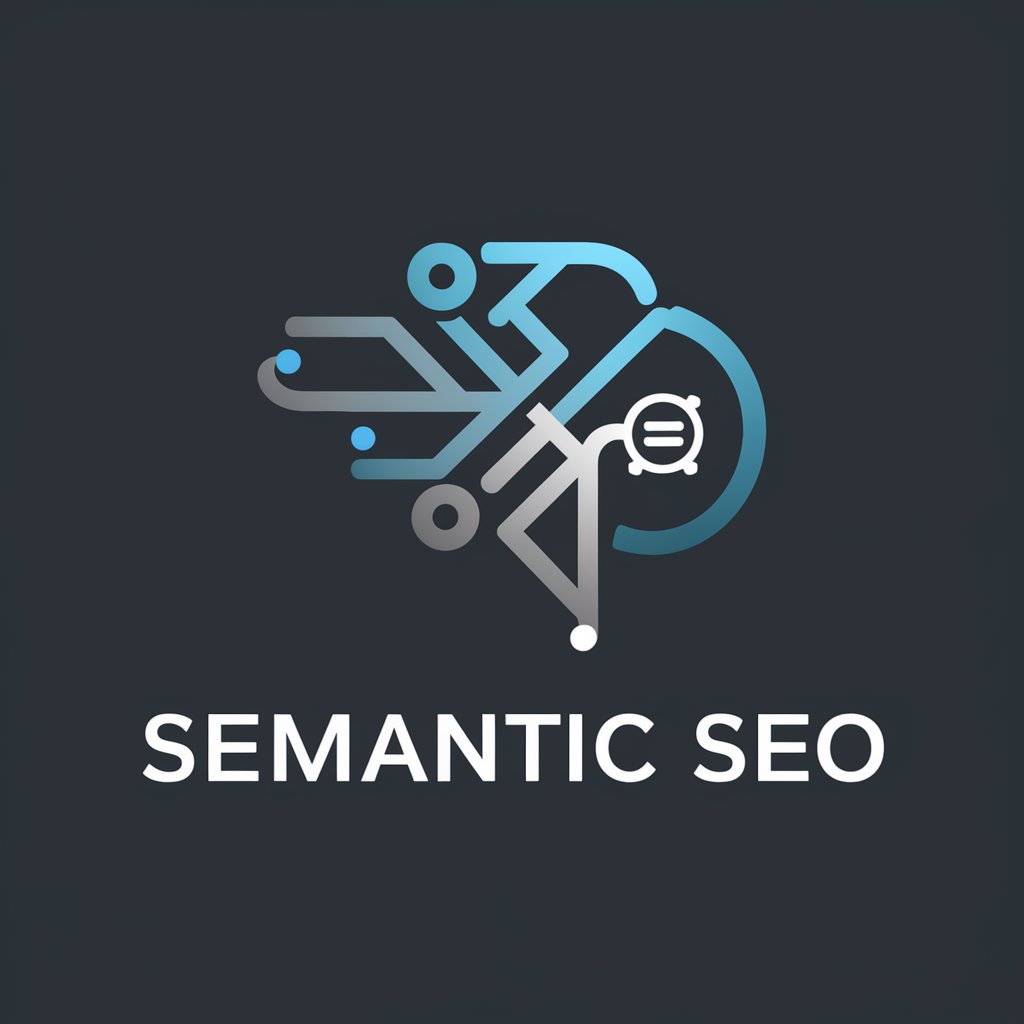Semantic SEO - Semantic Search Enhancement

Welcome to Semantic SEO, your gateway to advanced search optimization!
Elevating SEO with AI-Powered Insights
Create a detailed topical map for...
How can we optimize our content for...
Explain the benefits of using semantic SEO techniques in...
Generate a comprehensive strategy for improving search rankings with...
Get Embed Code
Semantic SEO: Enhancing Content with Meaning
Semantic SEO refers to the approach of optimizing web content by focusing on the meaning and context behind users' search queries rather than on specific keywords alone. This strategy is designed to improve content visibility and relevancy in search engine results by aligning with how search engines, particularly Google, use semantic search technology to understand and interpret the intent behind searches. Semantic SEO involves constructing a comprehensive semantic topical map around a central entity, ensuring the content network is rich in quality, relevance, and contextually related topics. For example, for a website about sustainable living, a semantic SEO strategy would involve creating content not just with specific keywords like 'sustainable living tips' but also covering related topics such as 'eco-friendly materials', 'renewable energy sources', and 'low-impact lifestyle choices', all interconnected in a way that enhances the site's topical authority and user experience. Powered by ChatGPT-4o。

Core Functions of Semantic SEO
Building Topical Authority
Example
Enhancing a website's expertise on 'sustainable living' by creating interconnected content across related topics.
Scenario
A blog focused on sustainability integrates detailed articles, guides, and resources on topics ranging from renewable energy to eco-friendly products, creating a rich, interconnected content network that signals topical authority to search engines.
Enhancing Content Relevance
Example
Creating content that answers specific user questions and intents related to 'solar energy benefits'.
Scenario
For a website selling solar panels, semantic SEO would involve crafting content that addresses comprehensive aspects of solar energy, including cost-benefit analyses, installation guides, and environmental impact, directly responding to varied user intents.
Improving User Experience and Engagement
Example
Structuring content in a way that offers easy navigation and in-depth exploration of related topics.
Scenario
An e-commerce site offering organic products uses semantic SEO to organize product pages and related articles, guides, and videos about organic living, making it easier for users to find and engage with the content they're interested in.
Optimizing for Voice Search and Natural Language Queries
Example
Tailoring content to answer conversational queries, anticipating voice search trends.
Scenario
A health and wellness platform optimizes its content to answer common voice search queries like 'What are the best natural remedies for a cold?', directly addressing the conversational and natural language patterns of users.
Who Benefits Most from Semantic SEO?
Content Creators and Bloggers
Individuals or teams focused on creating in-depth, authoritative content in specific niches will find semantic SEO invaluable for building topical authority and improving search visibility.
Digital Marketing Professionals
Marketing experts looking to enhance brand visibility and engagement through content will benefit from semantic SEO's focus on context and relevance, aligning content strategies with user intent.
E-commerce Businesses
Online retailers can leverage semantic SEO to better connect with potential customers by providing detailed, relevant content that guides them through the buyer's journey, from awareness to purchase.
SEOs and Web Developers
Professionals tasked with improving website performance and search rankings will use semantic SEO techniques to structure and optimize web content, ensuring it meets the evolving standards of search engines.

How to Use Semantic SEO
Start with a Free Trial
Begin by exploring yeschat.ai to access a free trial that requires no signup or subscription to ChatGPT Plus, providing an immediate start to your Semantic SEO journey.
Understand Your Content Needs
Identify the primary goals of your website or content, such as increasing organic traffic, enhancing user engagement, or improving search engine rankings, to tailor the Semantic SEO strategy effectively.
Conduct Thorough Keyword Research
Utilize tools to research relevant keywords and topics. Focus on understanding the intent behind search queries to create content that aligns with user needs and search engine semantics.
Optimize Content for Topics
Structure your content around topics rather than just keywords. Use related terms, synonyms, and entities to build a comprehensive topical authority that search engines can recognize.
Monitor and Adjust
Regularly review your content’s performance using analytics tools. Adjust your strategy based on insights gathered to improve rankings and meet your SEO objectives.
Try other advanced and practical GPTs
精英行研
Empower Decisions with AI-Powered Analysis

Genealogy & Whanau History Helper for Māori
Uncover your roots with AI-powered guidance.

PPU - Docs PUJ: Consultor Documental
Empowering research with AI insights

MLA Video Topic Generator Agent
AI-Powered Legal Video Inspiration

Music Mentor
AI-powered guitar learning assistant.

Global Insight Analyst
Empowering Decisions with AI-Powered Global Insights

Alex Hermozi Offer Genius
Empowering Offers, Unlimited Growth

Coffee News
Spreading joy with AI-powered news

Patrick Polite
Elevating Professional Communication with AI

Monochrome Muse
Elevating the Art of Black-and-White Photography

GDPR Helper
Streamlining GDPR Compliance with AI

O1 Visa Writer 4
Crafting Your Path to Recognition

Semantic SEO Q&A
What is Semantic SEO?
Semantic SEO refers to the process of building more meaning and context into web content. It involves optimizing content to understand the intent behind search queries, using related keywords, and structured data to improve relevance and search engine rankings.
How does Semantic SEO differ from traditional SEO?
Unlike traditional SEO, which focuses primarily on keyword optimization, Semantic SEO emphasizes understanding the searcher's intent and providing comprehensive content that covers related topics, terms, and concepts, thus improving content relevance and authority.
Can Semantic SEO improve website traffic?
Yes, by enhancing content relevancy and authority through Semantic SEO, websites can achieve higher search engine rankings for a broader range of queries, leading to increased organic traffic and improved user engagement.
What tools are essential for Semantic SEO?
Essential tools for Semantic SEO include keyword research tools, content optimization software, and analytics platforms. These tools help identify relevant topics, optimize content, and monitor performance for continuous improvement.
How long does it take to see results from Semantic SEO?
The time to see results from Semantic SEO varies depending on several factors, including the current state of the website, competition, and the depth of the optimization. Typically, noticeable improvements can be seen within 3 to 6 months.
